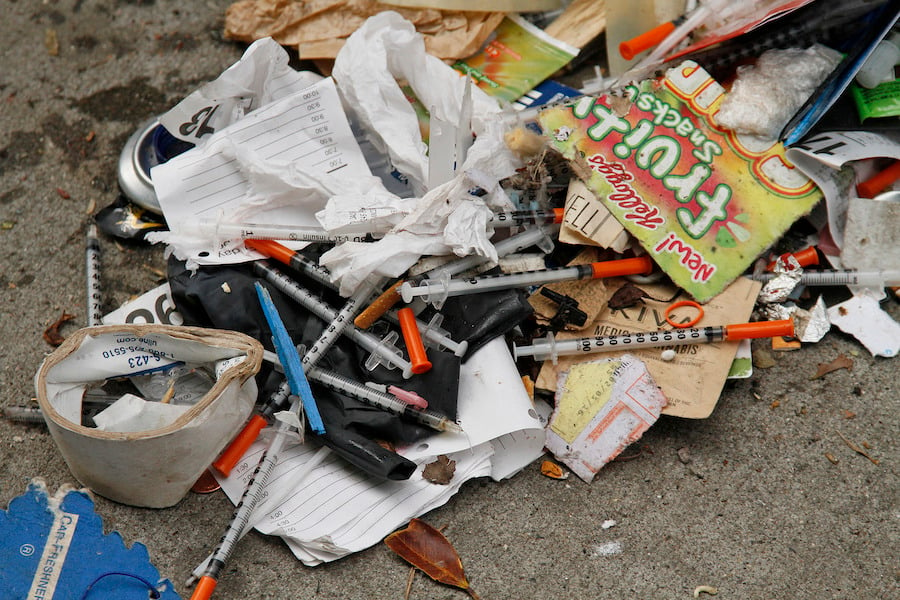PHILADELPHIA (CN) — A federal judge ruled it is in the public’s best interest that the nation’s first supervised drug-injection site in Philadelphia be barred from opening while federal prosecutors appeal the site’s legality.
“The combination of the pandemic and the momentous protests following the killing of Mr. George Floyd make this the wrong moment for another change in the status quo,” U.S. District Judge Gerald McHugh wrote in his 24-page opinion Wednesday.

An appeals court will now have the chance to review if the facility is legal before the Philadelphia nonprofit Safehouse can move toward opening the site.
The decision came the same week that, on the other side of the nation, San Francisco moved one step closer to opening a safe-injection site of its own, after its Board of Supervisors on Tuesday approved a law that will permit nonprofits to operate these facilities.
Eastern Pennsylvania U.S. Attorney William McSwain challenged Safehouse in February 2019 after it announced plans to open the site.
Philadelphia Mayor Jim Kenney and other city officials said they’d back such sites as a way to combat the city’s opioid crisis. Philadelphia has one of the highest opioid death rates in the country — of the 1,150 unintentional drug-related deaths in 2019, opioid overdoses were involved in more than 80% of cases.
However, McSwain called the facilities “consumption rooms” and said they would not comply with the federal Controlled Substances Act.
“Nobody anywhere, anyhow, is allowed to use heroin under the law,” McSwain said in September 2019 during the case’s district court hearing.
Still, Judge McHugh, a Barack Obama appointee, did not find the prosecutor’s argument convincing and granted Safehouse permission last October to open safe drug-injection facilities, where trained professionals would supervise injections of heroin or fentanyl, ruling that such establishments do not violate federal law.
But on Wednesday, McHugh put a hold on his own order and said the stay was in the public’s best interest because city and country officials are already overwhelmed with political challenges, reacting to both the Covid-19 public health crisis and widespread outrage over police brutality toward black Americans.
“The opening of Safehouse would require multiple public meetings, the time and attention of the City Health Department, and the allocation of police resources,” McHugh wrote. “Even if one assumes a flawless opening process, the operation of Safehouse would represent a significant change in how the city responds to opioid abuse, and such change would necessarily be disruptive.”
McHugh maintained that this stay was not granted because he was reconsidering whether the nonprofit’s agenda violated the so-called "crack house" provision, which bars operating an establishment "for the purpose of unlawfully manufacturing, storing, distributing or using a controlled substance," as McSwain had argued.
The judge said he still did not buy the government’s argument that legalizing Safehouse’s operations may "overturn Congress's determination that there is no legal use" for certain drugs.
“My ruling did not reach such a conclusion,” he said. “To the contrary, my opinion expressly noted that ‘opioid . . . possession is undisputedly criminal,’ and that, ‘[b]y definition, a person cannot lawfully use or consume a substance that the person cannot even lawfully possess.’”
“To the contrary, the need to inject under observation underscores the deadly potential of the banned substances,” he added. “And though the government scores a semantic point when it observes that ‘safe injection’ is an oxymoron when it comes to heroin, cocaine, and nonprescribed uses of fentanyl, if one looks beyond wordplay, it cannot be disputed that Safehouse’s efforts are focused on the safety through supervision of the user, not the safety of the act of injection.”
In a statement Thursday, Safehouse attorney Ilana Eisenstein of DLA Piper similarly called attention to the fact that McHugh’s latest ruling does not change the judge’s original conclusion that the sites don’t violate federal law.
“The court reinforces the public health arguments that Safehouse has been making for two years, and the court agrees that the public health data supports the benefits of supervised injection sites, shows favorable outcomes for individuals suffering from addiction, and may produce positive benefits for the community,” she said.
Safehouse had already previously decided at the end of February to put its first site opening on pause, after its attempt to open a South Philadelphia location at the start of this year was received poorly by some of the neighborhood’s residents, who opposed the facility on the basis that it would bring more drug users into their area. Within the next few weeks, the Covid-19 pandemic began to overshadow the city’s opioid epidemic.
Eisenstein further noted Thursday that those behind Safehouse still believe its overdose prevention services are needed in Philadelphia.
“Nonetheless, the court found it appropriate to wait to implement its decision until after the appeals process, particularly given that Philadelphia is presently struggling with the Covid-19 pandemic and grappling with the calls for profound change in the wake of the death of George Floyd,” the attorney said. “Safehouse will follow the law and will delay the opening of a site until we have legal authority to do so.”
A representative for the U.S. Attorney’s Office for the Eastern District of Pennsylvania did not respond to a request for comment Thursday.
Subscribe to Closing Arguments
Sign up for new weekly newsletter Closing Arguments to get the latest about ongoing trials, major litigation and hot cases and rulings in courthouses around the U.S. and the world.







